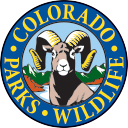Wildlife
Many migratory and resident birds inhabit the area including waterfowl, shorebirds and raptors attracted to the reservoir and adjacent meadows and uplands.
Birders may see the common raven, black-billed magpie, scrub jay, Rocky Mountain bluebird, red-winged and yellow-headed blackbird, western grebe, ibis, sandhill crane and the rare bald eagle. See the Crawford Bird Checklist.
Mule deer, cottontail rabbit, coyote, raccoon, prairie dog and ground squirrel make up some of the mammal population at the park.
Anglers are attracted to the warm-water and cold-water fishing opportunities, which include yellow perch, largemouth bass, channel catfish, rainbow and German brown trout, northern pike and crappie.
Plants
Ecologically, park uplands are dominated by pinyon-juniper woodlands, where Utah juniper, pinyon pine, mountain mahogany, Gambel oak, serviceberry, squaw-apple, Fendlerbush, Mormon-tea, skunkbrush and Spanish bayonet are overstory dominants. Western wheatgrass, Junegrass and galleta are common understory grass species in this community.
Deeper soils of upland flats support a sagebrush shrubland community dominated by big sagebrush, rabbitbrush, four-wing saltbush, shadscale, prickly-pear, western wheatgrass, galleta and squirreltail. West Slope grassland occurs in pockets within and bands adjacent to woodland and shrub communities.
The common grasses present include western wheatgrass, galleta and squirreltail. Diverse wetland, riparian and aquatic plant communities are established around the reservoir, within drainages, on ground water seeps and below the dam. Irrigated hay meadows have replaced native plant communities in much of the landscape surrounding the park.

